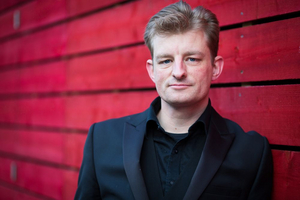
TOUR DE PARIS WITH ALEX ROOSE
St. John's Church
Reviewed by Ewart Shaw, Saturday 28th August 2021.
Ensemble Galante, provider of Baroque music on authentic instruments, has forged a partnership with bass-baritone, Alex Roose, which promises great things. The ensemble at this performance,
Tour de Paris, was Ben Dollman and Tom Helps, violin, Grahame Strahle and Catherine Finniss, viola da gamba, and Glenys March, harpsichord. Roose is one of many fine Australian musicians, artists, and actors chucked out of the UK a few years ago, in the lead up to Brexit. Their loss, as they say.
This tour of Paris in the Baroque period leads us on an intriguing walk around the other City of Light, spending a lot of time in the churches or, in one case, just down the road from one of most notable. Marin Marais (1656-1728 and not, as printed, 1756-1728) lived near the Church of St. Genevieve du Mont, which possessed a famous peal of bells. Word is, that the Marais piece,
Sonnerie du Sainte Genevieve-du-Mont, was composed by him in order to neutralize the sound of the bells which tormented him and his musical faculty. It's a fine piece, the first bars of which cropped up on several occasions in the concert. I first heard it in a fine arrangement for a different trio, the Jacques Loussier Trio, a performance well worth seeking out.
Roose has made a particular study of French ecclesiastical music, and the concert proper began with him ascending the pulpit in St John's, to deliver the Elevation of the Host at the heart of the Mass,
Venite Fideles (Come Ye Faithful). This was composed by Marc-Antoine Charpentier (1643-1704), master of music of the Sainte-Chappelle. He was also the composer of the motet,
Ascendat Ad Te, Domine (Our Prayers Ascend to Thee, O God), and
Unus Ex Discipulis Meis (One of my Disciples). The final work on the program was the short cantata by Francois Couperin (1668-1733),
Ad Te Levavi Oculos Meos (To You I lift my Eyes). This gave Roose a chance to show off his very impressive coloratura facility. He performed all these works with the generally accepted French-Latin pronunciation, which particularly makes the 'u' sound in a terminal 'us' rhyme more, much more, with 'Roose' than with 'bus'. There were three secular songs, one an anonymous love song,
J'Avois Cru que Vous Amant, in which his accent became slightly more vernacular,
Un Jour Le Berger Tircis, by Christophe Ballard (1641-1715), and one of that great collection of airs du cour, written generally at the court of Versailles.
Vos Mepris Chaque Jour, by Michel Lambert (1610-1696), was one I'd heard before. A while back Ensemble Galante played at Carclew, with guest artist Myriam Arbouz, who sang this beautifully. Yes, I do have a preference.
The ensemble decided to split one of the delightful
Balets du Village, of J. B. de Boismortier (1689-1755). This is one of a set of six rustic musical entertainments. I just wanted more.
Ensemble Galante can call on two fine viola da gamba players, Catherine Finniss and Grahame Strahle, who performed probably the saddest piece of French baroque you could find.
Tombeau les Regrets, a monument of grief, was eloquently played, but not even the brief final movement singing of the joys of the Elysian fields could raise the spirits. Monsieur de Saint-Colombe (1640-1700) composed more than forty of these duets for gamba. Next time can we have a happy one?
I was intrigued by the addition of Telemann (1681-1767) to a tour of Paris. The great and prolific Hamburg-based composer visited Paris in 1736 and wrote a set of quartets for the city's most able musicians. We had one movement, the
Modere from the last of the six suites. It was delicious. It is certainly a pointer for repertoire for the next concert.
Now, I've known Alex Roose since he was a young boy in the corridor of Radio 5UV accompanying his mother, Christabel Saddler. My mate Os and I saw his first operatic performance in Co*Opera's open-air performance of
Benjamin Britten's (1913-1976) A Midsummer Night's Dream in the gardens of Carrick Hill on March 4th 2001. There was a fierce gully breeze that night. He has grown into a confident and eloquent performer, and I look forward to hearing him again, and often.
Comments
To post a comment, you must
register and
login.
 TOUR DE PARIS WITH ALEX ROOSE
TOUR DE PARIS WITH ALEX ROOSE.png)
.png)


